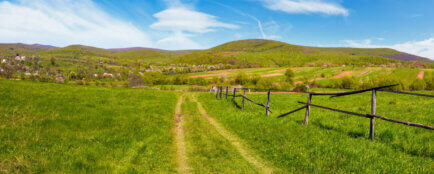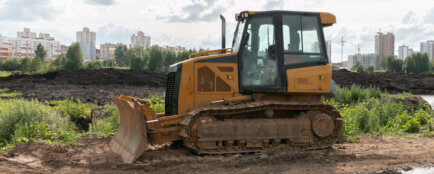There are many modifications to the situation described above: you can enter someone else’s property that is not marked and not know it; you can go there deliberately, but perhaps to deliver mail to a neighbour; or you can go secretly, at night, and cross a barbed wire fence. And there is also a crucial difference when you find yourself in someone else’s unfenced meadow and when you are in someone else’s house or adjacent fenced garden. All these aspects will play a role in the subsequent assessment of the illegality of the situation.
If we want to look to the law for answers to questions about possible trespass, theCriminal Code will provide the basic guidance .
It is quite uncompromising. It characterises trespass as a criminal offence where the perpetrator unlawfully enters or enters the home of another or remains there unlawfully. This carries a penalty of up to two years’ imprisonment, or up to three years’ imprisonment if violence or threats are used, or up to five years’ imprisonment if weapons are used or there are more than one offender.
Which land can we enter?
Of course, trespassing is an extreme on one side of the spectrum. But we are in a different situation. We want to walk from one village to another. The path goes through meadows, fields and woods, and we don’t want to violate any regulations or the rights of anyone else. At the same time, we are not aware of the property rights of each piece of land. Do we need to go through the land registry and study the ownership rights to all parts of the planned path before each walk ? This is undoubtedly not the case. But a little bit of caution is needed.
In general, we are free to enter land owned by the state, a municipality or other legal entity. What is important is the nature of the land. It is primarily land such as woodland or meadow that is freely accessible, not state land used for military purposes.
Are you solving a similar problem?
Are you looking for an answer to a specific legal question about an interference with your freedom of the home or another right?
Email us and you will have a response from one of our attorneys within 48 hours.
I want to consult
- When you order, you know what you will get and how much it will cost.
- We handle everything online or in person at one of our 6 offices.
- We handle 8 out of 10 requests within 2 working days.
- We have specialists for every field of law.
Tip for article
Tip: Need to quickly find out independent information about your desired property? Or do you want to be sure that the land belonging to your neighbour will not complicate your access to it? Check out our guide to searching and reading the cadastral map to find out what you can check on the cadastral map and what to look out for.
And where are we not allowed to enter?
Built-up or construction land, yards, gardens, vineyards, hop gardens and land intended for farming and animal husbandry are excluded from free passage . At the same time, the Wildlife and Countryside Act says that you must not cause damage to another person’s property or health by passing through, and you must not interfere with privacy or neighbouring rights.
Although many fields and meadows are in the hands of private owners (individuals), and therefore the right of free passage generally does not apply on these lands. But at the same time, many people are not bothered by the normal passage of tourists and do not regulate them in any way or draw attention to private property. In practice, therefore, if we walk through open countryside, see no signs, fences or enclosures anywhere, and have no knowledge of the landowner, we can move about quite freely.
On the other hand, we will not enter fenced gardens, factory premises and certainly not anywhere where there is any kind of barrier or information sign like “Private land, please do not enter”. Such an entry or use of someone else’s land would be unauthorized.
Tip for article
Tip: Find out how to avoid pitfalls and various mistakes when buying or selling a property. We’ve focused on concise advice and practical tips on what to look out for and compiled them into a clear e-book. We’ve added links to useful articles so you can get all the information you need.
What exceptions apply in the forest?
In the previous lines we have said that free passage is guaranteed under certain conditions on the lands of the state, municipalities and legal entities. Land owned by individuals is exempt from the right of free passage through the countryside. However, such a restriction does not apply in the case of a forest. According to the Forestry Act, everyone has ‘the right to enter the forest at their own risk, to collect forest fruits and dry bark lying on the ground for their own use‘, regardless of who owns the forest. If a natural person owns a forest, he or she may fence part of it, for example, when establishing a forest nursery, game preserve, etc. Otherwise, the forest owner must tolerate visitors.
The opportunity to create a game preserve and then close it to the public must not be abused. This was also decided by the Constitutional Court in the case of the Jelenice game preserve in the Ostrava region. In its ruling, the Court stated that the closure of a game preserve to the public may be made only at the request of the user of the hunting ground in justified and at the same time time time-limited cases. Restrictions on access can be ordered under the Hunting Act, for example, during nesting, laying and rearing of chicks or during hunting periods.
Other exceptions for trespassing
Other exceptions to trespassing can be traced across various laws.
The first one is given by the Civil Code in the context of the regulation of neighbouring rights. It states that
- The owner shall allow the neighbour to enter his land at the time, to the extent and in the manner necessary for the maintenance or management of the neighbouring land, if this purpose cannot be achieved otherwise; however, the neighbour shall compensate the landowner for the damage caused thereby.
- Similarly, access must be granted, if necessary, to persons in charge of the networks and pipes that run through the land (energy, communications, water supply, etc.).
- The police may, in the exercise of their powers, not only enter the property under certain conditions, but also open a secure and locked apartment or house. This is in cases where they are safeguarding the health or lives of certain persons or where security is at risk. Firefighters have similar powers.
- Some cases of trespass must be dealt with by the courts. These are so-called easements and establishing access to someone else’s land, where a landowner can claim a right of way or path to a public road across another person’s land if other means of access are impossible. The owner must be compensated. Establishment of the right can be done without a court, by agreement of both owners of the land concerned.
- Another fairly obvious exception is if the owner himself allows us access to his land, invites us onto it, or at least does not fence it off in any way and does not draw any attention to the existence of private land.
Tip for article
Getting into contact and maybe even a scuffle with a police officer or officer can happen to anyone – you don’t have to be an environmental activist who’s just stuck to the road. How do the powers of police officers and constables differ and how do you actually tell them apart? That’s the subject of our separate article.
How to protect your assets?
But what if you are on the other side of the “barricade” and it is your property that you want to secure in some way against unwanted movement of strangers. What are your options?
Generally, any form of fencing is available. This can generally be undertaken under the Building Regulations if the erection of the fencing does not require ground disturbance, the land is not adjacent to a public road and is outside a conservation area and built-up area. At the same time, the height of the fence must not exceed two metres.
In specific cases, it depends, of course, on the type of land, its size and its location in the landscape. While you can use wire fencing for a piece of meadow for grazing your cattle, for a house with a garden, for example, you might choose a wooden or brick fence.
Today also offers a range of electronics, from CCTV systems to various detectors and sensors that can alert you to unwelcome visitors.
However, the protection of your own property should always be proportionate. So you can install alarms, erect barriers and acquire strong locks, but if you thought of linking a crossbow to a motion detector to “take out” any unwelcome visitors, then the court would no longer be on your side.




